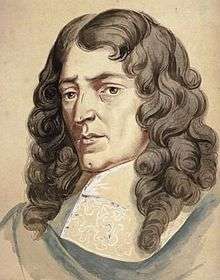La descente d'Orphée aux enfers
| Marc-Antoine Charpentier |
|---|
 |
|
Operas
|
La descente d'Orphée aux enfers (English: The Descent of Orpheus to the Underworld) is a chamber opera in two acts by the French composer Marc-Antoine Charpentier. It was probably composed in early 1686 and probably was performed either in the private apartment of the Dauphin that spring, or at Fontainebleau in the fall. Charpentier himself sung the title role and was joined by the musicians of Mademoiselle de Guise and the members of the Dauphin's little ensemble. This was Charpentier's last appearance with the Guise ensemble.
The libretto, whose author is unknown, is based on the myth of Orpheus as told by Ovid in Book 10 of the Metamorphoses. It is debatable whether the opera as it survives in the manuscript is complete or not. The musicologist H. Wiley Hitchcock believes Charpentier may have planned (and composed) a third, concluding act.
The opera is not to be confused with an earlier work by Charpentier, Orphée descendant aux enfers, which is a cantata for three male voices.
Roles
| Role | Voice type | Premiere Cast, 1686 or 1687 (Conductor: - ) |
|---|---|---|
| Orphée | haute-contre | François Antoine [1] |
| Euridice | soprano | |
| Pluton | bass-baritone | |
| Proserpine | soprano | |
| Ixion | haute-contre | Marc-Antoine Charpentier |
| Apollon | bass-baritone | |
| Aréthuze | alto | |
| Tantale | tenor | |
| Daphné | soprano | |
| Énone | soprano | |
| Titye | bass-baritone | |
Synopsis
Act 1
Orphée (Orpheus) is celebrating his marriage to Euridice (Eurydice) in a beautiful, pastoral landscape. Euridice and her nymph companions gather flowers, but Euridice steps on a snake, is stung and dies. Encouraged by his father Apollon (the god Apollo) Orpheus decides to follow Euridice to the underworld and rescue her.
Act 2
Orpheus arrives in the underworld where he sees Tantale (Tantalus), Ixion and Titye (Tityus) being punished eternally for their crimes. Orpheus' singing allays their suffering. His music also wins over Pluton (Pluto, the god of the underworld), who allows him to return with Euridice to the world of the living providing he does not turn back to look at her before they have left the realm of the dead.
Selected recordings
- Paul Agnew, Sophie Daneman, Patricia Petibon, Les Arts Florissants, conducted by William Christie (Erato, 1995)
- Grammy-winning recording made in Bremen (CPO, 2013)
References
- ↑ for further information about this singer cf. Catherine Cessac, "Les Arts Florissants - Actéon", in Philidor/CMVB, p. 173 (accessed 6 August 2010)
- Booklet notes to the above recording by H. Wiley Hitchcock
- Patricia M. Ranum, Portraits around Marc-Antoine Charpentier (Baltimore, 2004), pp. 314–15, for the probable date, place, and patron